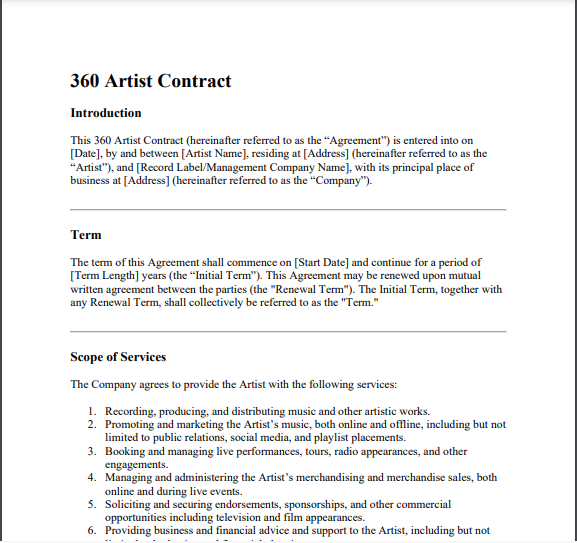
Record Label Contracts – Ready to use
Customizable Contract Templates
Explore a collection of professionally drafted contracts for record labels. Find our customizable contract templates and expert advice.
Avoid legal issues
Our expertly-crafted contract templates help you navigate the complex legal landscape with ease, ensuring that you and your artists are protected from potential legal disputes.
Save Time
Forget about spending hours drafting contracts from scratch. Our ready-to-use templates streamline the process, freeing up valuable time for you to invest in your label’s growth and success.
Focus on your artists
With the peace of mind that comes from using our reliable contract templates, you can devote your energy to nurturing your artists’ talent, fostering their creativity, and taking their careers to new heights.
All contracts needed to run a record label
360 artist contract
Record Label Contract
Artist Development Contract
Master Recording License agreement
and more..
Secure your record label today
A Guide to Contracts for Record Labels: Key to Success in the Music Industry
Starting a record label involves more than just a love for music—it also demands an understanding of the intricacies of music industry contracts. These contracts are a record label’s lifeblood, shaping its relationship with artists, songwriters, and producers. In this guide, we’ll demystify these essential documents, from 360 artist contracts to work-for-hire agreements, and offer crucial tips for successful contract negotiation.
Types of Record Label Contracts
As a record label owner, you’ll likely encounter a variety of contract types. Here’s what you need to know about each:
1. 360 Artist Contract:
A 360 deal, also known as a “multiple rights deal,” allows your label to receive a percentage of an artist’s income from all sources—not just music sales. This can include touring, merchandise, endorsements, and more.
2. Artist Development Contract:
Under this agreement, the label commits to developing an artist’s career, often providing financial support for recording, marketing, and promotion.
3. Band Partnership Agreement:
This contract outlines the terms of a band’s partnership, including profit sharing, decision-making processes, and what happens if a band member decides to leave.
4. Copyright License Agreement:
This document allows your label to use an artist’s copyrighted work, typically in exchange for royalties. The specific terms can vary widely, so it’s crucial to spell everything out.
5. Master Recording License Agreement:
Under this contract, your label receives the rights to a master recording, allowing you to reproduce, distribute, and sell the recording.
6. Merchandising Agreement:
A merchandising agreement allows your label to produce, sell, and distribute merchandise featuring an artist’s likeness, brand, or logo.
7. Musician Services Contract:
This agreement covers the services provided by a musician, such as studio recording time or live performances.
8. Record Label Contract:
This is the overarching contract between the label and an artist, covering everything from recording to promotion to financial arrangements.
9. Sync Licensing Agreement:
A sync licensing agreement permits your label to use an artist’s music in synchronization with visual media—like films, TV shows, or commercials.
10. Work for Hire Agreement:
In a work-for-hire agreement, your label hires a musician to perform specific work—like a studio session—and retains the rights to the result.
Navigating Contract Negotiations as a Record Label Owner
As a label owner, contract negotiations can make or break your business. Here are some crucial strategies for success:
1. Understand the Business:
A deep understanding of the music industry, including the various types of record label contracts, will empower you to make informed decisions and negotiate effectively.
2. Obtain Legal Advice:
A music lawyer with a lot of experience can help you understand these difficult papers and make sure that your label’s concerns are protected properly.
3. Communicate Clearly:
Transparency and clear communication are key in contract negotiations. Ensure your artists understand the terms, and be open to discussions and adjustments.
A Record Deal is something that comes with a lot of expectations, so be transparent from the beginning.
4. Be Fair and Flexible:
Fairness fosters long-lasting, fruitful relationships.
While it’s important to protect your label’s interests, a contract that is also beneficial to the artist will result in a more harmonious and successful partnership.
Building a Successful Record Label
Managing a record label is a delicate balance between business and creativity. Here are key considerations:
1. Identify Talent:
As a label owner, your ability to spot and nurture talent will be a cornerstone of your success. Use your industry knowledge and intuition to identify promising artists and invest in their development.
2. Build Strong Relationships:
Successful record labels have strong networks. Thus, it’s crucial to build relationships not just with artists, but also with producers, managers, venue owners, and other industry professionals.
3. Build Shared Resources:
Invest in marketing and promotions but promote several artists at the same time. Consider, what resources can you create and let your artists utilize? Playlists? Contract Templates? Network?
4. Understand Your Market:
Know your audience and their preferences. Tailor your promotions, merchandise, and even your artist roster to meet your target market’s tastes and expectations.
5. Keep Up With Industry Trends:
The music industry is fast-paced and ever-evolving. Stay on top of trends, whether it’s emerging genres, innovative marketing techniques, or changes in how music is consumed.
In conclusion, a sound understanding of record label contracts and effective contract negotiation skills are essential to running a successful record label. As you navigate the music industry, keep these tips in mind to help you build a thriving, artist-friendly record label.
